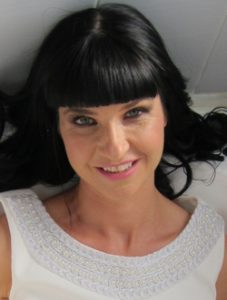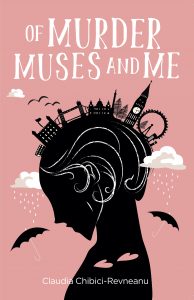Creativity Studies And Tricks For (Women) Writers
 Do you love the creative process, but at times find it almost unbearably difficult? I can only answer with a solemn “I do.” Being an avid reader of Virginia Woolf, including her famous A Room of One’s Own, I started to suspect that writing, while difficult for everyone, can (given the mostly men-oriented system we still live in) sometimes be even harder for women. So, I decided to do a PhD on the creative process of novel writing – for women.
Do you love the creative process, but at times find it almost unbearably difficult? I can only answer with a solemn “I do.” Being an avid reader of Virginia Woolf, including her famous A Room of One’s Own, I started to suspect that writing, while difficult for everyone, can (given the mostly men-oriented system we still live in) sometimes be even harder for women. So, I decided to do a PhD on the creative process of novel writing – for women.
In the happy phase of reflection that followed the publication of my first novel Of Murder, Muses and Me in 2017, I realised how much my academic work helped me make my writing dream come true. So, I decided to share some of the ideas I learned from years of research, including reading countless books on the subject and conducting many interviews with women writers.
To begin with, our culture is obsessed with innate talent and its loftier relative of “genius”- two ideas that are myths and inaccurate “explanations” of creative achievement. Although they may seem “neutral”, they are deeply gender biased. The original Roman usage of “genius” was that of a spirit of masculinity. Women had their own female counter-part, Juno. As to talent, Dale Spender, in her book The Writing Or the Sex?, Or, Why You Don’t Have to Read Women’s Writing to Know It’s No Good, shows how we are culturally faster to assign “talent” to men and “effort” to women. Worse, there is a bias against women writing and other creative achievements, that involuntarily makes us judge women’s work as less clever or original than men’s.
But the problem with this approach to creativity isn’t just gender bias. It also portrays creativity as something “aristocratic” – a distinction one is either born with, or not. Many works in creativity studies prove this to be wrong. That isn’t to say – although the complete solution of the nature-nurture question might forever remain a mystery – that we don’t have some perhaps innate inclinations. Some clearly long to write while others prefer to study biochemistry. But apparently our “interest” in a field is the talent. From there on, creative development is in many ways dependent on “work”. But what does work mean?
For novel writers, it certainly includes developing technical skills, like learning how to structure a plot, or write dialogue. It means writing and reading a lot, practicing until something we’re reasonably happy with will emerge. Beyond that, however, there seem to be other aspects that can be cultivated to increase creativity. Here’s a list of the elements that helped me the most:
- Love and intrinsic motivation: While extrinsic factors like money or fame can help you to get moving, love for literature is most likely to make you write well. Not only does intrinsic motivation usually increase creativity, it’s also love that will see you through the dark days of inevitable rejection letters. Ultimately, love turns writing into a fulfilling path – with or without external recognition.
- Persistence: According to the editor-gone-agent Betsy Lerner, persistence is the single most important predictor among writers “who make it” and those who don’t. This is partly because rejection really is the norm when it comes to submitting one’s writing. The willingness to constantly improve one’s skills, drafts and to keep on submitting are therefore an essential part of most writer’s development.
- Letting go of the critical voice: There are moments in the creative process – re-reading a first draft for instance – when critical awareness of a work’s flaws is important. During many other stages it isn’t. For many writers, one of their key battles is with their own critical voices that tell them they are untalented, writing things that no-body cares about and so on. Having this voice is normal. But it’s crucial not to take it too seriously. There are tricks to befriend or silence this voice. One is to draw and even name it and write down all the debilitating things it usually says. This can create a sense of distance. Another one is a tight deadline, like granting oneself an hour for the first draft of a short story. This way, the critical voice doesn’t have time to get involved and the unconscious takes over to get things done.
- Confidence: For several creativity researchers, confidence is one of the key ingredients for creativity. But how can one be confident given problems such as gender bias, talent obsessions and rejection letters? It helps to regard confidence more in terms of “self-efficacy”. According to social psychologist Bandura, achievement often depends not so much on what we are but on what we believe ourselves capable of. This can mobilise our energies to sit down, work and acquire what we need to know as part of the process. Again, ability is not as fixed as our “aristocracy of talent” culture wants us to think.
- Permission: This seems to be a major obstacle for many writers, especially women. As Nobel Prize Winner Toni Morrison said in an interview, for many female creators “It’s almost as if you needed permission to write”. Allowing ourselves the meaningful “luxury” of writing can become an act of liberation, not only for ourselves but also others, enriching the world with voices that would have been silenced otherwise.
Now, these ideas have helped me – and others when I taught them in different workshops – enormously. Without them, I couldn’t have coped with Of Murder, Muses and Me. Maybe some of them can assist you on your path. Maybe you knew them all along. And maybe some of you have other tricks which you’ll share to make us feel accompanied on this glorious and gloriously difficult journey.
—
Facebook: https://www.facebook.com/claudiachibici/
Claudia Chibici-Revneanu is a geographically confused Austrian, who lived for a long time in the UK and works as a lecturer at the National Autonomous University of Mexico (UNAM) in León, Mexico. She holds a PhD in Cultural Policy Studies from the University of Warwick which focused on the creative process of women writers. In 2017 she won the medal Sor Juana Inés de la Cruz for women at the UNAM, for combining her academic work which her passion for promoting literary and musical composition for women and other “groups” usually excluded from the status quo. She regularly holds creative and expressive writing workshops and, as a mezzo-soprano, gives concert-conferences about women composers. Of Murder, Muses and Me, published by Jacaranda in 2017 and to be released in Spanish by Universo de Libros in 2019 is her first novel.
 When bestselling author Mark Drubenheimer is found dead in his studio, Rosalind Waterloo’s world collapses.
When bestselling author Mark Drubenheimer is found dead in his studio, Rosalind Waterloo’s world collapses.
The official story is that the author committed suicide, but for his devoted fan Rosalind, there is only one explanation: Drubenheimer was murdered, and Rosalind is the only person who can expose the killer. Rosalind takes her investigation to London and to the heart of the publishing industry where she encounters an intriguing cast of characters; an eccentric editor, a modest muse, a wounded widow and a mesmerising mystery man.
With her sanity now in question, Rosalind is even more determined to uncover the truth behind Drubenheimer’s death regardless of the dramatic consequences. Of Murder, Muses and Me is a sharp and witty debut by a promising talent.
Category: Contemporary Women Writers, How To and Tips






























